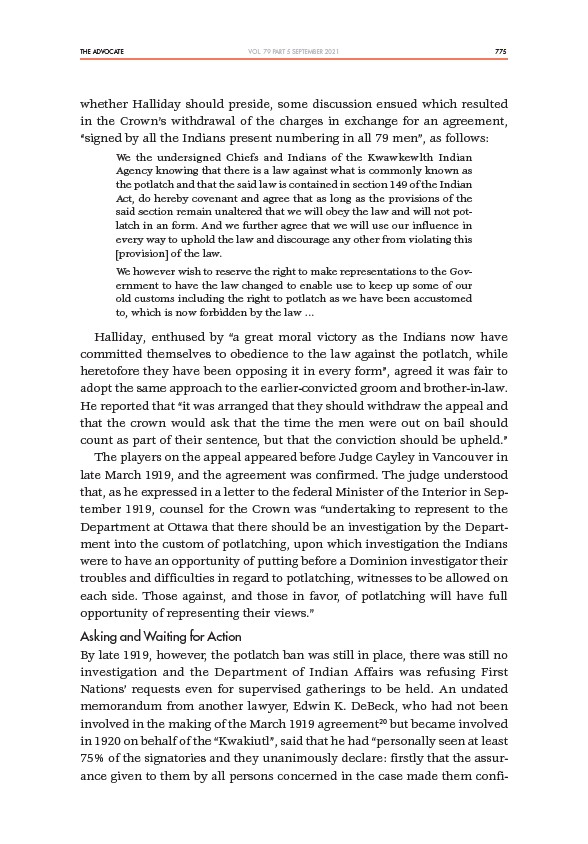
THE ADVOCATE 775
VOL. 79 PART 5 SEPTEMBER 2021
whether Halliday should preside, some discussion ensued which resulted
in the Crown’s withdrawal of the charges in exchange for an agreement,
“signed by all the Indians present numbering in all 79 men”, as follows:
We the undersigned Chiefs and Indians of the Kwawkewlth Indian
Agency knowing that there is a law against what is commonly known as
the potlatch and that the said law is contained in section 149 of the Indian
Act, do hereby covenant and agree that as long as the provisions of the
said section remain unaltered that we will obey the law and will not potlatch
in an form. And we further agree that we will use our influence in
every way to uphold the law and discourage any other from violating this
provision of the law.
We however wish to reserve the right to make representations to the Government
to have the law changed to enable use to keep up some of our
old customs including the right to potlatch as we have been accustomed
to, which is now forbidden by the law …
Halliday, enthused by “a great moral victory as the Indians now have
committed themselves to obedience to the law against the potlatch, while
heretofore they have been opposing it in every form”, agreed it was fair to
adopt the same approach to the earlier-convicted groom and brother-in-law.
He reported that “it was arranged that they should withdraw the appeal and
that the crown would ask that the time the men were out on bail should
count as part of their sentence, but that the conviction should be upheld.”
The players on the appeal appeared before Judge Cayley in Vancouver in
late March 1919, and the agreement was confirmed. The judge understood
that, as he expressed in a letter to the federal Minister of the Interior in September
1919, counsel for the Crown was “undertaking to represent to the
Department at Ottawa that there should be an investigation by the Department
into the custom of potlatching, upon which investigation the Indians
were to have an opportunity of putting before a Dominion investigator their
troubles and difficulties in regard to potlatching, witnesses to be allowed on
each side. Those against, and those in favor, of potlatching will have full
opportunity of representing their views.”
Asking and Waiting for Action
By late 1919, however, the potlatch ban was still in place, there was still no
investigation and the Department of Indian Affairs was refusing First
Nations’ requests even for supervised gatherings to be held. An undated
memorandum from another lawyer, Edwin K. DeBeck, who had not been
involved in the making of the March 1919 agreement20 but became involved
in 1920 on behalf of the “Kwakiutl”, said that he had “personally seen at least
75% of the signatories and they unanimously declare: firstly that the assurance
given to them by all persons concerned in the case made them confi-